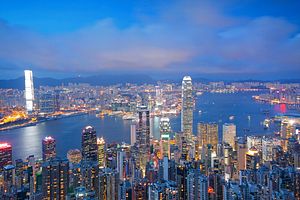Hong Kong has retained its status as the world’s freest economy for the 20th straight year, fighting off a challenge from neighboring Singapore in the latest Heritage Foundation survey. However, while the Asia-Pacific was the most improved region, many of its countries remained “mostly unfree,” according to the report’s authors.
Announcing Tuesday the 2014 Index of Economic Freedom, the conservative U.S. think tank said Asia was “a study in contrasts,” containing four of the world’s freest economies, including third-placed Australia and fifth-ranked New Zealand, but also three of the most repressed in Timor-Leste, Turkmenistan and bottom-placed North Korea.
Across the region, 28 economies earned improved scores. These included Singapore, which climbed to within a point of Hong Kong, and others including Indonesia, Japan, Malaysia, South Korea and Taiwan.
Singapore’s rise to its highest grading ever reflected “the emergence of a more dynamic and competitive financial sector, boosting its productivity through an openness to global trade and investment,” the authors said.
Australia and New Zealand retained high rankings for “clean, corruption-free government,” benefitting from “transparent and efficient business environments and open-market policies,” although both were marked down on government spending.
The Philippines joined six other developing countries in gaining the status of “moderately free,” while Indonesia was acknowledged for its continued rise in the rankings over the past five years, “successfully navigating the global economic uncertainty and turning what could have been a setback into an opportunity to upgrade its economic system.”
Yet 14 economies posted declines, including Mongolia and Thailand, with countries ranked “mostly unfree” including India and China, ranking 120th and 137th, respectively.
“These two countries’ high economic growth has not been deeply rooted in policies that promote economic freedom,” the report said in commenting on the two nations.
“The foundations for long-term economic development continue to be fragile in the absence of effectively functioning legal frameworks. Progress with market-oriented reforms has been uneven and has often backtracked at the urging of those with a political interest in maintaining the status quo,” it added.
The report said progress among BRIC nations had stalled, with Brazil slipping to “mostly unfree” while Russia, India and China all dropped further down the international scale.
“Despite the global progress over the past two decades, which occurred most dramatically in the 10 years from 1998 to 2007, the number of people living in economically ‘unfree’ countries remains very high: 4.5 billion, or about 65 percent of the world’s population,” the report said.
“The path to prosperity for these individuals is very difficult indeed. More than half of these people live in just two countries, China and India, where advancement toward greater economic freedom has been patchy at best.”
Somewhat ironically, the United States was listed as “the only country to have recorded a loss of economic freedom for seven straight years,” dropping to the status of only “mostly free” after one of the longest sustained declines in the index’s history.
Published annually since 1995 by the Heritage Foundation and The Wall Street Journal, the index evaluates 186 countries based on the rule of law, regulatory efficiency, limited government and open markets.
Significantly, the report said economies rated “free” or “mostly free” in the latest index “enjoy incomes that are more than three times higher than average incomes in all other countries, and more than 10 times higher than the incomes of ‘repressed’ economies.”
Lower Inequality
Yet despite the linkage between economic freedom and higher incomes, a study by four economists at Roger Williams University has instead pointed to the main benefit being reduced income inequality.
“Regression analysis reveals that economic freedom is not significantly related to per capita income. Instead, the size of physical capital investment per person, degree of gender inequality, the level of government corruption and political stability appear to be the most significant determinants,” Peter Dunn, Maria Kula, Priniti Panday and James Vernon wrote in a paper titled “Economic development revisited: Does economic freedom matter?” published by the Global Business and Economics Research Journal.
“With regard to income distribution however, economic freedom appears to have a significant relation, with greater economic freedom resulting in lesser inequality. Besides economic freedom, differences in gender inequality and land resource are significantly related with income inequality, with greater gender equity and more land resource contributing to lower income inequality.”
According to the economists, increased opportunities for women in the workforce added to national output while alleviating population pressures, while greater capital investment and reduced government corruption had a “significant impact” on per capita income.
Will policymakers in China and India heed the message?
































